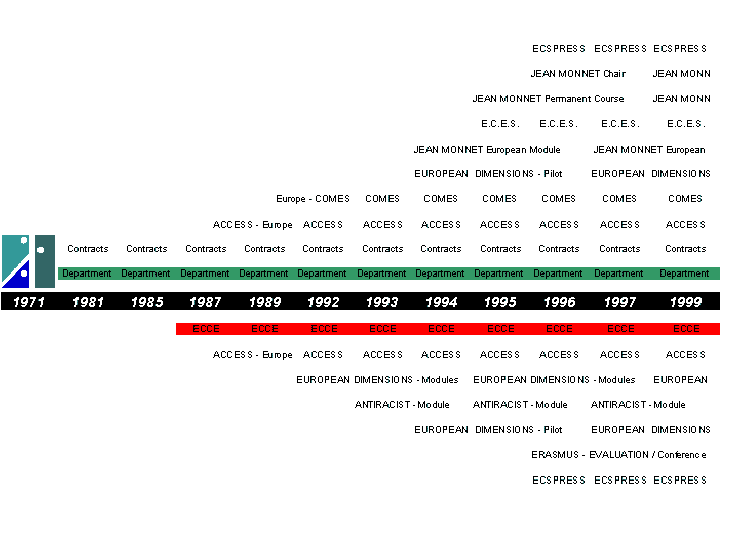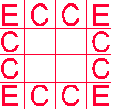
Community Education
European Dimensions

European Dimension

European
dimensions in the training
of social professions at the
Fachhochschule (University of Applied
Sciences) Koblenz
Development
The development of international / intercultural dimensions in the training of professional workers dates back as far as 1971. Since its very beginning the department of Sozialpädagogik (Social Pedagogics) at the Fachhochschule in Koblenz has fostered the international and especially the European co-operation and the exchange between institutions of Higher Education. Initially this took place - based on informal contacts of individual lecturers - in the form occasional exchange programmes (bilateral seminars) which were organised without any financial grants and existing infrastructure.
International contracts
On the occasion of the 10th anniversary of the department of Sozialpädagogik in 1981, formalised contracts were signed between the department and universities in Bologna /Italy and London/England, and in 1982 they were followed by contracts with Edinburgh/Scotland and Östersund/Sweden. Regular bi- and multi-lateral exchange programmes for students and teaching staff have been organised. In the following years - especially within the framework of the ERASMUS programme - the co-operation was extended to over twenty partners all over Europe. (Partner)
However, for this quantitative and qualitative expansion of international activities none of the universities involved had the necessary infrastructure for the planning, organisation and evaluation of the programmes. Therefore an organisation (legal status: „registered charity“) was founded in 1985: The „European Centre for Community Education – ECCE“. This international, non-governmental organisation (NGO) had as founding members two main groupings: lecturers of universities from Germany (Koblenz), Greece (Athens), Great Britain (Edinburgh, Leicester, London), Italy (Bologna ) and Sweden (Oestersund), and staff of organisations active at national and international level in the field of international youth exchange.
ECCE has different functions:
-
Providing services for partner institutions with respect to the exchange of students and staff, and the organisation of bi- and multilateral seminars
-
Organising seminars for (initial and further) training in multilateral exchanges and intercultural work
-
Developing models of practise of community education and didactical concepts to prepare prospective workers during their training for practise.
For further details
see section entitled
ECCE
Publications
Development
With financial help of the ERASMUS-bureau in Brussels(CMA-87-D-001) ECCE developed a more formalised joint study programme in 1987: "Additional Certificate in Community Education Studies – ACCESS-Europe".
The department of Sozialpädagogik was accepted as co-ordinating department for all partner institutions. Since the academic year 1988/89 this course is accepted as an Inter-University Co-operation Programme and has been subsidised by the ERASMUS bureau.
„ACCESS-Europe“ is a certificate course, additional to, but integrated into the student's own professional training course. It is designed as a modular training scheme i.e. students have the opportunity to select individual units according to their interests and motivation.
Module 1: Language tuition
Module 2: European Community Studies
Module 3: Two bilateral seminars (6 days) or one multilateral seminar (10-14 days)
Module 4: Studies and / or practice abroad
The certificate is awarded by ECCE in conjunction with the respective university in the home country of the student.
"ACCESS-Europe" as pilot scheme for postqualifying education
1994 "ACCESS-Europe" was financed for three years as a pilot programme for post-qualifying education from the Ministry of Education in Rheinland-Pfalz. ECCE formed a consortium with the Department of Sozialpädagogik at the Fachhochschule and the Department of language studies at the University of Koblenz. This allowed the participation of practitioners in order to gain the certificate. In this context the four modules of ACCESS were adapted to the new format and elaborated study material was developed.
For further details see section entitled "ACCESS-Europe"
In 1989 - based on the "ACCESS-Europe" programme - the department of Sozialpädagogik extended its international study programme. Another certificate course: „European Community Education Studies – Europe-COMES“ was developed and implemented in the existing course structures. It encompasses:
-
The passing of the "ACCESS-Europe" certificate
-
Membership in a student’s study-project with international / intercultural dimension
-
Participation in courses which are provided for „Europe-COMES“.
Together with their Diploma students who have passed the programme successfully receive an additional certificate from the department staing in detail the single units.
For further details see section: "Europe COMES"
European Community Education Studies – E.C.E.S.
Based on the existing developments and experiences with "ACCESS-Europe"and "Europe-COMES" the department of Sozialpädagogik has introduced the independent course programme : „European Community Education Studies – E.C.E.S“ in 1995/96. Students have to spend one year of their studies at a European partner university. The intention is to get the diploma or degree (B.A. or M.A.) of the partner institution in addition to the German Diploma.
For further details see section: E.C.E.S.
European Dimensions in the Initial Training for Youth and Community Workers
In 1992 ECCE received funding from the Commission of the European Communities through its Task Force: Human Resources, Education Training and Youth, for the first phase of a project whose purpose was to explore the European Dimension(s) in the initial training of youth workers. A team of lecturers (Chair: Prof. Seibel, Koblenz) from four departments from Cork (Ireland), Leicester (England), Bologna (Italy) and Koblenz (Germany) were invited to investigate the question which qualifications, skills and attitudes youth and community workers need in a changing Europe. In international teams four modules were developed, which have been /will be implemented in the courses at the participating institutions:
Module 1 : Philosophical starting points, concepts and approaches to youth work
Module 2 : Framework and co operation between state, welfare and voluntary bodies
Module 3 : Social Policy for young people
Module 4 : Youth work competencies for good practice in international/intercultural youth work
Publications
In addition to the production of the modules: “European Dimensions....” ECCE was given the task to develop a special module for post-professional training in international youth work in 1993. An expert team (Chair: Prof. Lorenz, Cork) with members from France, the Netherlands, Great Britain, Ireland and Germany was responsible for developing and testing the module. In the meantime the module is translated into English, German and Italian and successfully implemented in basic and post-professional training.
The Jean Monnet programme
In 1994 the department of Sozialpädagogik applied successfully for financial grants through the EU programme „Action Jean Monnet – European Integration in the course programmes of Higher Education Institutes“.
-
Since 1995/95 courses with relevant topics concerning the European Integration are offered for students of all faculties (European Modules)
-
Since 1995/96 the department of Sozialpädagogik offers courses: „Social dimensions of European Integration“ and „ The European Integration and Youth“ (Permanent Courses)
-
Because of his continuous engagement for international affairs at the Fachhochschule Koblenz and in the department of Sozialpädagogik Prof. Seibel was awarded a „Jean Monnet Chair“ in 1996.

